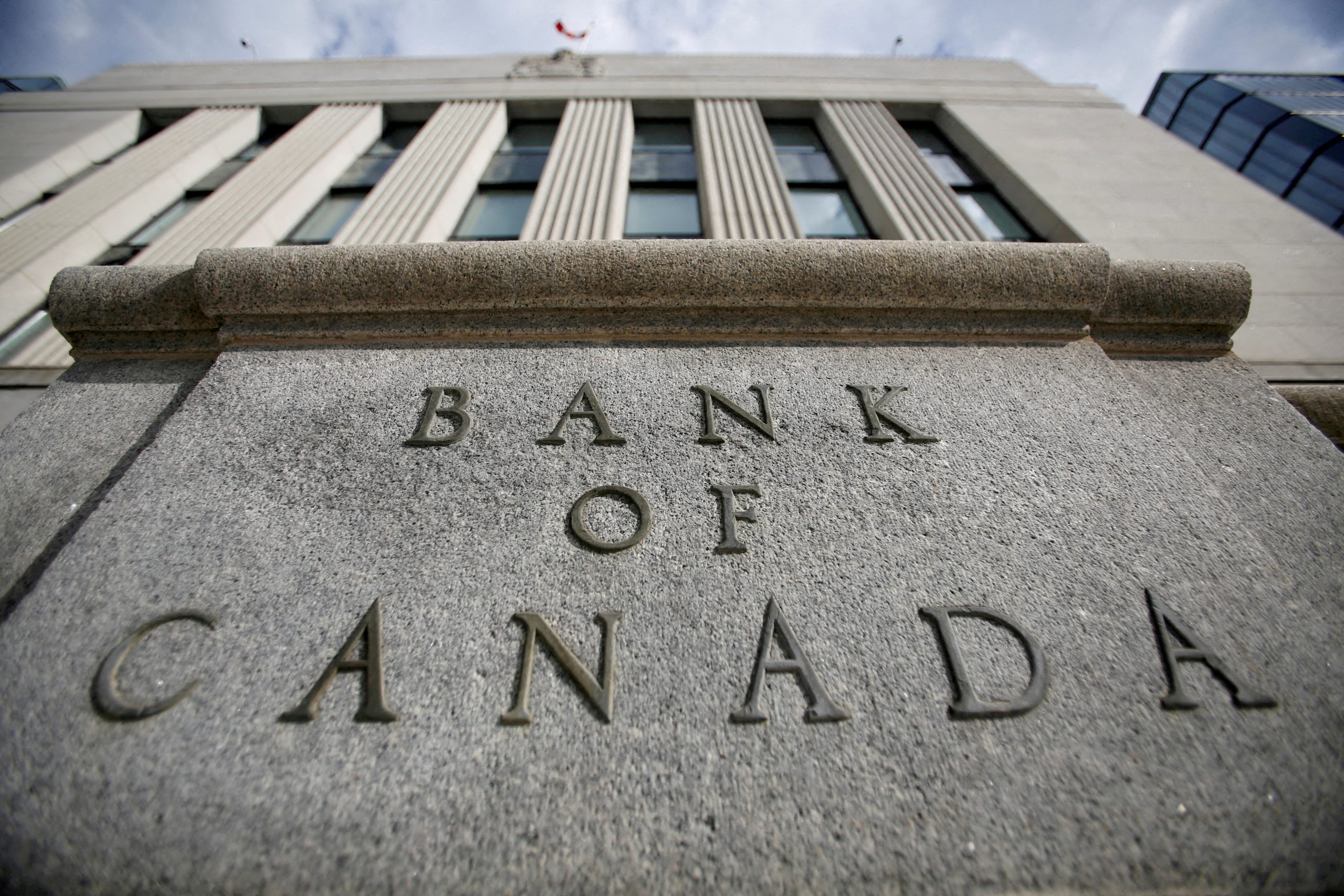Economy
Bank of Canada: Economy needs more capacity investment, not stimulus

|
|
Canada’s economy does not need more stimulus, but rather more investment from both government and businesses to build up supply capacity to meet strong consumer demand, Bank of Canada Governor Tiff Macklem said on Wednesday.
Macklem, when asked in an audience Q&A session if government should be spending to further stimulate the economy, said Canada is already in the midst of a consumer-led recovery, and more capacity investment is needed to sustain that.
“To sustain a strong consumer-led recovery, you need investment,” he said. “Whether it’s businesses or governments, what we need is more focus on building that supply capacity.”
“Demand is now looking self-sustaining,” he added.
Canadian Prime Minister Justin Trudeau during his election campaign last year pledged C$78 billion https://www.reuters.com/article/us-canada-election-idCAKBN2FX3M7 ($62 billion) in new spending over five years to foster Canada’s economic rebound.
Macklem said that with inflation well above the central bank’s 2% target, productivity growth was more vital than ever. Businesses can help increase productivity by investing in new technology to boost efficiency, he said.
“For the economy as a whole, investment is critical to non-inflationary growth,” he said.
If Canadian businesses fail to go ahead with planned investments, it could impact the path of rate increases, he later told reporters.
“If productivity growth is weaker, that means we’re going to have less growth in potential output in the economy, less expansion of our supply capacity and, other things equal, that means that interest rates would have to go up more,” he said.
PRODUCTIVITY LAGS
Despite a stronger rebound in employment than seen in the United States, Canada’s productivity growth continues to lag. This is both due to more public health restrictions and lower business investment, said Macklem.
“The question is, does COVID-19 provide us with an opportunity to change our course? I believe it does,” said Macklem, pointing to the pandemic-driven rise in digital investments and remote work.
Corporate balance sheets are strong, consumer demand is high and U.S. demand for Canadian exports is rising, with investment intentions among firms at their highest level since 1999, Macklem said.
The central bank signaled last month it would soon start hiking rates https://www.reuters.com/business/finance/hike-or-not-its-toss-up-ahead-bank-canada-rate-decision-2022-01-26, saying the economy no longer needed pandemic-level supports. Money markets see the first increase in March, with six in total this year. [BOC WATCH]
The Canadian dollar was trading 0.3% higher at 1.2670 to the greenback, or 78.93 U.S. cents.
($1 = 1.2669 Canadian dollars)
(Reporting by Julie Gordon and David Ljunggren in Ottawa; Additional reporting by Fergal Smith in Toronto; Editing by Alex Richardson, Kirsten Donovan and Mark Porter)
Economy
Poland has EU's second highest emissions in relation to size of economy – Notes From Poland
[unable to retrieve full-text content]
Poland has EU’s second highest emissions in relation to size of economy Notes From Poland




Source link
Economy
IMF's Georgieva warns "there's plenty to worry about'' in world economy — including inflation, debt – Yahoo Canada Finance

WASHINGTON (AP) — The head of the International Monetary Fund said Thursday that the world economy has proven surprisingly resilient in the face of higher interest rates and the shock of war in Ukraine and Gaza, but “there is plenty to worry about,” including stubborn inflation and rising levels of government debt.
“ Inflation is down but not gone,” Kristalina Georgieva told reporters at the spring meeting of the IMF and its sister organization, the World Bank. In the United States, she said, “the flipside” of unexpectedly strong economic growth is that it ”taking longer than expected” to bring inflation down.
Georgieva also warned that government debts are growing around the world. Last year, they ticked up to 93% of global economic output — up from 84% in 2019 before the response to the COVID-19 pandemic pushed governments to spend more to provide healthcare and economic assistance. She urged countries to more efficiently collect taxes and spend public money. “In a world where the crises keep coming, countries must urgently build fiscal resilience to be prepared for the next shock,” she said.
On Tuesday, the IMF said it expects to the global economy to grow 3.2% this year, a modest upgrade from the forecast it made in January and unchanged from 2023. It also expects a third straight year of 3.2% growth in 2025.
ADVERTISEMENT
The world economy has proven unexpectedly sturdy, but it remains weak by historical standards: Global growth averaged 3.8% from 2000 to 2019.
One reason for sluggish global growth, Georgieva said, is disappointing improvement in productivity. She said that countries had not found ways to most efficiently match workers and technology and that years of low interest rates — that only ended after inflation picked up in 2021 — had allowed “firms that were not competitive to stay afloat.”
She also cited in many countries an aging “labor force that doesn’t bring the dynamism” needed for faster economic growth.
The United States has been an exception to the weak productivity gains over the past year. Compared to Europe, Georgieva said, America makes it easier for businesses to bring innovations to the marketplace and has lower energy costs.
She said countries could help their economies by slashing bureaucratic red tape and getting more women into the job market.
Paul Wiseman, The Associated Press
Economy
Nigeria’s Economy, Once Africa’s Biggest, Slips to Fourth Place – BNN Bloomberg


(Bloomberg) — Nigeria’s economy, which ranked as Africa’s largest in 2022, is set to slip to fourth place this year and Egypt, which held the top position in 2023, is projected to fall to second behind South Africa after a series of currency devaluations, International Monetary Fund forecasts show.
The IMF’s World Economic Outlook estimates Nigeria’s gross domestic product at $253 billion based on current prices this year, lagging energy-rich Algeria at $267 billion, Egypt at $348 billion and South Africa at $373 billion.
Africa’s most industrialized nation will remain the continent’s largest economy until Egypt reclaims the mantle in 2027, while Nigeria is expected to remain in fourth place for years to come, the data released this week shows.
Nigeria and Egypt’s fortunes have dimmed as they deal with high inflation and a plunge in their currencies.
Bola Tinubu has announced significant policy reforms since he became Nigeria’s president at the end of May 2023, including allowing the currency to float more freely, scrapping costly energy and gasoline subsidies and taking steps to address dollar shortages. Despite a recent rebound, the naira is still 50% weaker against the greenback than what it was prior to him taking office after two currency devaluations.
Read More: Why Nigeria’s Currency Rebounded and What It Means: QuickTake
Egypt, one of the emerging world’s most-indebted countries and the IMF’s second-biggest borrower after Argentina, has also allowed its currency to float, triggering an almost 40% plunge in the pound’s value against the dollar last month to attract investment.
The IMF had been calling for a flexible currency regime for many months and the multilateral lender rewarded Egypt’s government by almost tripling the size of a loan program first approved in 2022 to $8 billion. This was a catalyst for a further influx of around $14 billion in financial support from the European Union and the World Bank.
Read More: Egypt Avoided an Economic Meltdown. What Next?: QuickTake
Unlike Nigeria’s naira and Egypt’s pound, the value of South Africa’s rand has long been set in the financial markets and it has lost about 4% of its value against the dollar this year. Its economy is expected to benefit from improvements to its energy supply and plans to tackle logistic bottlenecks.
Algeria, an OPEC+ member has been benefiting from high oil and gas prices caused first by Russia’s invasion of Ukraine and now tensions in the Middle East. It stepped in to ease some of Europe’s gas woes after Russia curtailed supplies amid its war in Ukraine.
©2024 Bloomberg L.P.
-



 Tech22 hours ago
Tech22 hours agoCytiva Showcases Single-Use Mixing System at INTERPHEX 2024 – BioPharm International
-



 Health18 hours ago
Health18 hours agoSupervised consumption sites urgently needed, says study – Sudbury.com
-
News18 hours ago
Canada's 2024 budget announces 'halal mortgages'. Here's what to know – National Post
-



 Science5 hours ago
Science5 hours agoJeremy Hansen – The Canadian Encyclopedia
-
News17 hours ago
2024 federal budget's key takeaways: Housing and carbon rebates, students and sin taxes – CBC News
-



 Tech20 hours ago
Tech20 hours agoNew EV features for Google Maps have arrived. Here’s how to use them. – The Washington Post
-
Tech23 hours ago
Nintendo Indie World Showcase April 2024 – Every Announcement, Game Reveal & Trailer – Nintendo Life
-



 Science18 hours ago
Science18 hours agoGiant, 82-foot lizard fish discovered on UK beach could be largest marine reptile ever found – Livescience.com







